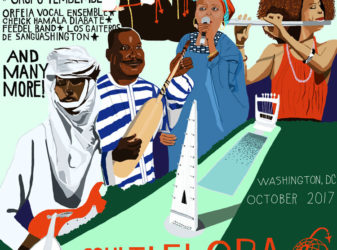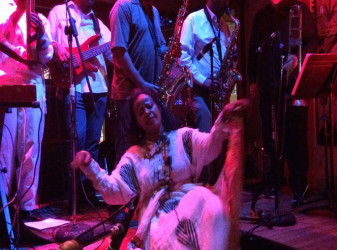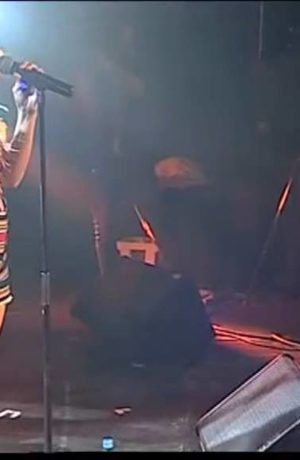Eclectic Wizard: Jim Thomson Might Be D.C.’s Most Interesting Booker
Posted by Ally Schweitzer for DC City Paper on Jan. 16, 2013
By a certain hour most Fridays and Saturdays, U Street NW can begin to feel a little tense: earpiece-wearing bouncers loom in club doorways, turning people away; women in stilettos totter over bulges in the narrow sidewalk; little spats break out over who hailed a cab or claimed a parking spot first.
Descend an unmarked staircase into Tropicalia, an intimate dancehall under a Subway sandwich shop, and that tension evaporates. At least it did one evening a few days before Christmas: Angolan dance troupe Os Kuduristas was getting ready to kick off a battle against D.C. groups Urban Artistry and Lionz of Zion. A semicircle had formed on the dance floor. DJ Stylus pumped a turbo-fast soundtrack from the club’s speakers as the crowd whooped and hollered. It was a party, yeah—but no one seemed wasted. In fact, the bartenders looked like they didn’t have enough to do. It was still early, and Tropicalia probably had the best atmosphere U Street was going to see all night.
Standing on the crowd’s fringe was the club’s booker, Jim Thomson, stalking the floor in his thick-rimmed glasses and casually tilted fedora. He looked like a cool guy, no doubt—if a little out of place among the twentysomethings in streetwear. Yet Thomson, 47, deserves much of the credit for making Tropicalia the most interesting new club in D.C.
Thomson keeps it booked five nights a week, usually with DJs or bands that play some strain of African or Latin music. Admission stays low or free as a kind of “maverick marketing move,” he says. Since opening last August, Tropicalia has found a niche in the crevices untouched by neighboring music venues like Patty Boom Boom, U Street Music Hall, and Bohemian Caverns: On Sundays it hosts dance lessons and Brazilian music; in the middle of the week, it’s been funk, soul, disco, or, one time, prerevolution Iranian rock. Tropicalia is all over the place—and Thomson is an all-over-the-place kind of dude.
It’s still surprising that he found his way here. As a student at Virginia Commonwealth University in the mid-1980s, Thomson played drums in the satirical heavy-metal band Gwar. During the band’s “Dim Time,” as it’s known to fans—long before Gwar reached the cult status it has today—he went by the name Hans Orifice. He dropped out of school in 1985 (“I think my highest grade my freshman year…was a C in yoga,” he says), the same year he joined the instrumental rock group Alter Natives, which went on to release three records on the landmark punk label SST. Thomson then hopped all over the musical spectrum, but always maintained a feel for experimentation: He played percussion with Richmond salsa group Bio Ritmo for eight years, toyed with rock music in Plasmodium and Tulsa Drone, and made clattering funk with CSC Funk Band.
Thomson says he’s never held a desk job. He once worked at a T-shirt factory. He waited tables for years, moved furniture, worked in construction, painted houses, and catered. He’s dabbled in booking, but never full-time for a club: His first big show was a Bad Brains gig in Richmond in 1986. Through a connection with avant-garde guitarist Marc Ribot, he brought a mix of out-there downtown New York acts to Richmond in the ’90s and learned how to fill up a calendar by booking a joint called Bottom’s Up Pizza. After that, he worked as a waiter and music programmer at a Latin bistro in Manhattan. In 2009, he started his own label, Electric Cowbell. To date, he’s released around two dozen funny, arty, wacky, and occasionally brilliant 45s from, among others, boogaloo ensemble Spanglish Fly, Ethiopian jazz act Debo Band, and “circus-punk” marching band Mucca Pazza. This year he’s getting ready to put out a full-length from the Maryland-based ngoni player Cheick Hamala Diabaté, among other releases.
Thomson’s mother never really understood his career path. “My mom, she’s just always like, ‘You still playing in that band?’” he says. Bio Ritmo played at Wolf Trap once, “and that made everything kind of legit. Otherwise she just didn’t understand what I was doing.”
Last year, after six years in Brooklyn, Thomson moved to Arlington, four blocks from where he lived for the first year of his life. He didn’t have a job. He started asking his friends if they knew anything he could do. “‘You know me. Do you know anybody who’s looking for a man like me?’”
***
“We wanted to make a dancehall for grown-ups,” says Brian Liu, a local artist, design company director, and DJ who was Tropicalia’s creative director until November. About two years ago, Local 16 owner Aman Ayoubi was hatching a plan to open a “music and art” club—“more like Black Cat,” he says—at 14th and U streets NW. But Liu pitched Ayoubi a different concept: a dancehall and bar inspired by Brazil’s 1960s Tropicália scene, the radical, psychedelic art movement made famous by musicians like Gilberto Gil, Gal Costa, and Os Mutantes. Liu wanted the club to be a place where people could walk in off the street, listen to music they never thought they’d hear, dig it, and say, as Liu puts it, “‘I have no idea what the fuck they’re playing, I have no idea what language this is, and I don’t care.’”
Ayoubi liked Liu’s concept, and the designer got to work. But the venue still needed a booker. A mutual friend connected Thomson with Liu. “Jim came highly recommended,” says Liu. He “didn’t have the baggage of being in D.C. for a long time…he was kind of fresh, and he had impeccable taste.” By late August, Thomson was booking bands at the basement club. Tropicalia officially opened Aug. 30.
Anyone who missed Tropicalia in its first few months couldn’t be blamed. The club didn’t host a grand opening party or stuff hype into bloggers’ inboxes. Ayoubi and Liu made a decision to keep it lower-key and let news travel by word of mouth. Now that it’s open, the spot doesn’t reach out and grab passers-by, despite its prime location at the northeast corner of 14th and U. “It’s a little tricky to get people to come downstairs,” says Thomson.
Those who do know about Tropicalia might confuse it for another internationalist venture from restaurateurs Ian and Eric Hilton. The siblings run several other trendy spots nearby, and Tropicalia’s global bent seems like something Eric Hilton—one half of the continent-hopping loungetronica duo Thievery Corporation—would slap his name on. When I mention that to Ayoubi, he chuckles. He’s owned places with Hilton before, including the iconic club that made Hilton synonymous with classy, multiculti nightlife, and arguably set the standard for upscale nightclubs in D.C.: Dupont’s Eighteenth Street Lounge.
Liu, a friend of Hilton, says he wanted the club to stray from Hilton territory—partly out of respect, but also for the sake of variety. He preferred to reserve slots for acts that weren’t a part of Hilton’s ESL label, or didn’t have a home at other clubs in town. “Initially, we kind of steered clear of any acts that were always ESL acts,” he says. “We didn’t want more of the same.” The spotlight was supposed to fall on music of any genre that “didn’t have a homebase in D.C. right now,” he says. Many of the musicians that now play Tropicalia could have easily been booked by small promoters at spots like Restaurant Judy, Liv, Bossa, Hilton’s Montserrat House, Comet Ping Pong, or any number of eateries, but there’s no place that does it all under the same roof five nights a week. Plus, Tropicalia’s approach offered a fringe benefit: “Great music repels douchebags,” Liu says.
Yet Tropicalia hasn’t completely stepped out of Eighteenth Street Lounge’s long shadow. Several DJs who regularly spin at the lounge—the Sol Power All Stars, Fort Knox Five, Sam “the Man” Burns—now play Tropicalia, too. That’s mostly the handiwork of Farid Nouri, one of the original partners of Eighteenth Street Lounge, whom Ayoubi roped in to secure DJ talent in the club’s nascent days. Thomson still skips reggae to avoid conflicts with Hilton’s Patty Boom Boom, the Jamaican-style club that sits next door to Tropicalia.
Sticking to a schedule of noncommercial global sounds—the ESL variety or otherwise—hasn’t resulted in lines out the door, a predicament for a club at one of D.C.’s most competitive nightlife corners. “Everyone said the same thing” early on, Liu says. Either the club would be “completely full of assholes and, like, Beyoncé within like six months, or it’s gonna die completely.”
Any venue owner on U Street would speak to the challenges of balancing artistry with profit. “Business-wise, it is tough,” says Ayoubi. The costs of operating in the neighborhood, he says, are “outrageous. I mean really, really outrageous.” Meanwhile, Tropicalia doesn’t have a full-time manager; Local 16’s manager splits his time between both places. Liu stopped working with the club last fall, largely because he felt he’d reached the limits of what he could achieve there. (He says he left on good terms.) Ayoubi says he’s tried to spend strategically in order to keep the music unique: splurge on the occasional live acts but save money other nights with cheaper DJs. Or book a band that’s playing the Kennedy Center or another venue that same night—because the band will play his club for a lower price. “That way, it can be sustainable,” he says.
For now, Thomson still has free rein to bring in the music he wants. Ayoubi largely stays away from the booking. “He’s so supportive,” says Thomson. He just says, “‘You do your thing, buddy.’” Meanwhile, Thomson chafes at the idea of competing with nearby clubs. “I tend to loathe competition. I thrive on the collaborative,” he says. But after we hang up, he calls back to clarify. He says he doesn’t want to sound like he doesn’t care if the club makes money—because he does care. “I feel like there’s a way to share the wealth,” he says. “Maybe I’m just an old-fashioned commie.”
Thomson seems to be enjoying getting away with what he can. Last month, he kicked off a monthly party with D.C.’s DJ Underdog and Okayafrica, a cultural guide to African music affiliated with hip-hop website and record label Okayplayer. He’s joined forces with the DJ Collective Maracuyeah, known for its subcultural Latin-music parties at tiny local restaurants and bars. But he’s still learning about the neighborhood and D.C.’s music scenes. Thomson stresses that he doesn’t feel like a local yet.
He’s been surveying D.C. mostly from his perch on U Street NW. On a Friday night in September, Thomson says, the Williamsburg Salsa Orchestra was playing down in Tropicalia. He stepped outside and heard music coming from all directions on U Street, wafting in and out. Right then, “it felt like such a great American music city to me,” he says. “I could have been wrong. But I just remember standing in places like Nashville at one time in my life, or Austin, Texas; or San Francisco… or New Orleans,” he says, and he wondered, “Is that D.C.? Is that what D.C. is turning into?”
To those who have been listening, D.C. may already sound like a great American music city. But Thomson could play a role in keeping it that way—for as long as he can, at least. “If I don’t hear the ‘You do your thing, buddy,’ I might start getting nervous,” he says. If it doesn’t work out, he’s got a backup plan. “I can always wait tables, I guess.”
Photo by Darrow Montgomery











